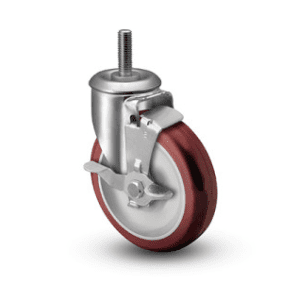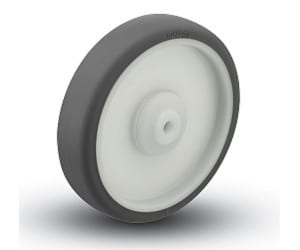 Caster manufacturers understand that while casters can withstand extreme temperatures, the people that operate them cannot. As a result, the manufacturers can adjust these temperatures based on whether a person will be operating them in the same environment or not.
Caster manufacturers understand that while casters can withstand extreme temperatures, the people that operate them cannot. As a result, the manufacturers can adjust these temperatures based on whether a person will be operating them in the same environment or not.
For example, the Performa wheel, offered as an option by the Colson Caster Corporation on many of their products, has a specified temperature range of -45 to +120 degrees Fahrenheit for continuous use, and 180 degrees Fahrenheit for intermittent use. The continuous range maximum, 120 degrees, corresponds to what workers may encounter in a hot factory or outdoors in the summer. By allowing operations at 180 degrees intermittently, the manufacturers have designed a safety margin for equipment that may be out in the hot sun, or positioned temporarily near an industrial oven.
In some applications, the temperatures will be much higher. In pharmaceutical and healthcare settings, equipment is often sterilized at temperatures of 250 to 300 degrees. Bakery ovens might be set at 350 degrees. Curing ovens for painted or powder coated products, or environmental chambers for testing electronic parts may approach 500 degrees.
For these high temperature environments, manufacturers make modifications that enable their casters to stand up to the heat. We’ll look at what those modifications are in the next section, and then examine some specific products that Douglas Equipment carries, and which are designed for high temperature use.
What to Look for When Things Get Hot
As temperatures climb and environments get harsh, manufacturers evaluate almost every aspect of a caster for its ability to withstand high heat and challenging conditions.
- Wheel Material – Casters are available with a wide variety of tread and wheel materials. Not all are suitable for high temperature use. Of those that are, polyurethane— this typically has the lowest temperature rating, at approximately 180 degrees F. Glass-filled nylon wheels can be used up to approximately 350 degrees (if the casters have the appropriate bearings and grease; see below). High temperature phenolic wheels can be used at 450 degrees, engineered resin wheels at 480 degrees, and cast iron or steel wheels at 600 degrees.
- Lubrication – For casters designed to function at higher temperatures, manufacturers must use grease and other lubricants that are rated for the higher heat. If necessary, they will also add seals to prevent the lubricants from flowing out of the caster.
- Bearings – The steel ball bearings found in standard casters will not hold up well at high temperatures. Manufacturers will often use stainless steel, which has a higher rating. Another option is to use a bronze sleeve in the wheel bore, in place of ball bearings; it has a higher rated temperature, but won’t roll as well. Bearings in both the swivel section and wheels must be chosen for high temperature operations.
- Duty Cycle – Many specifications for high temperature products refer to one temperature for continuous operation, and another temperature for intermittent operation. This means that a caster may be able to operate at a higher temperature, if it is subjected to that temperature only for brief periods. This may be the case, for example, in a sterilization oven in a medical facility where the equipment is at full temperature for only a few minutes.
Now that we’ve seen what some of the considerations are, let’s look at examples of products that Douglas Equipment carries, and which are designed for a range of high temperatures.
Products Designed and Built for High Temperatures
Douglas Equipment is an authorized distributor for the Colson Caster Corporation, a company that has been in business for over 125 years. Colson makes a range of products designed to operate in high temperatures.
Below are some wheel options that Colson provides for high temperature use. The wheels are presented in order of increasing continuous temperature use.
- TPE HI-TEMP Wheels – These wheels are designed for environments with moderately high temperatures. They can be used at up to 180 degrees F. continuously, or up to 300 degrees intermittently. They are economical, having a tread made from a gray thermoplastic elastomer, chemically bonded to a core of white polyolefin. They have a single insert molded stainless steel radial bearing. These wheels work well in the medical field, or in situations requiring the equipment to be washed down frequently.
- Thermo High Temp Wheels – These wheels can be used at continuous temperatures up to 480 degrees F., and can be operated intermittently at temperatures up to 525 degrees. Colson molds these wheels from an exclusive engineered resin compound. Their life expectancy exceeds high temp phenolic wheels by more than three times with the same load capacity. Even when exposed to high temperatures, the wheels maintain a consistent bearing bore. They won’t mark floors, and absorb almost no water. They resist vegetable oils, salt solutions, and animal fats.
- ThermoTECH Wheels – The ThermoTECH Wheels can be used at continuous temperatures as high as 490 degrees F., or intermittently up to 525 degrees. The tread is an advanced technology rubber that can withstand the heat. It is also bonded to an aluminum core. The wheels are quiet and are non-marking for excellent floor protection.
Colson makes these wheels available with their high temperature casters. TPE HI-TEMP Wheels are available here and the Thermo High Temp Wheels and ThermoTECH Wheels can be ordered here.
Call Douglas Equipment for Help with High Temperature Casters!
At Douglas Equipment, we also distribute high temperature casters from Albion, Hamilton and other manufacturers. If you contact our customer service team at 800-451-0030 (or 305-888-3700 in the Miami area), or even online through our contact form, our experts will be able to guide you to the best casters for your unique temperature and operating conditions.





